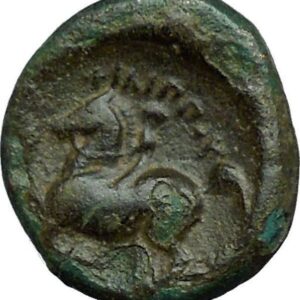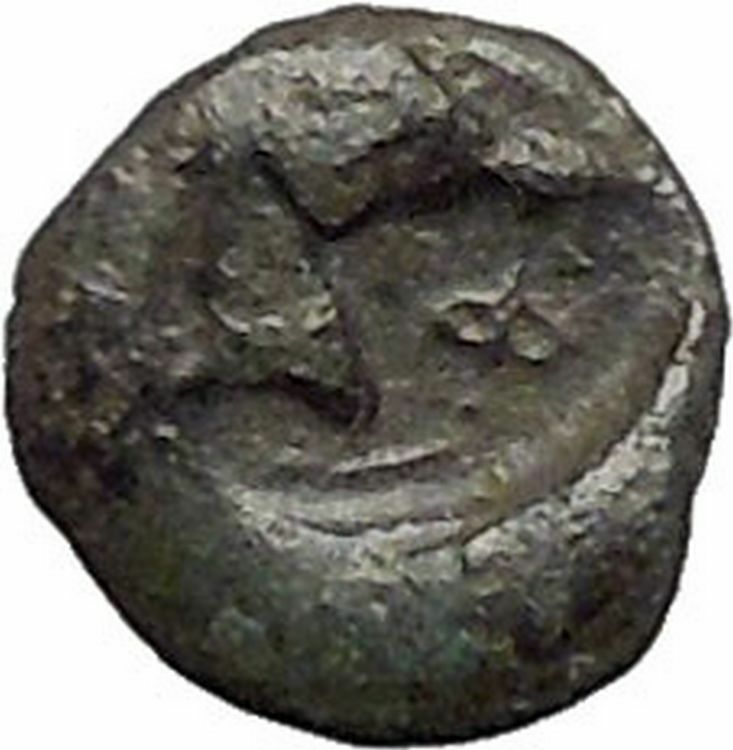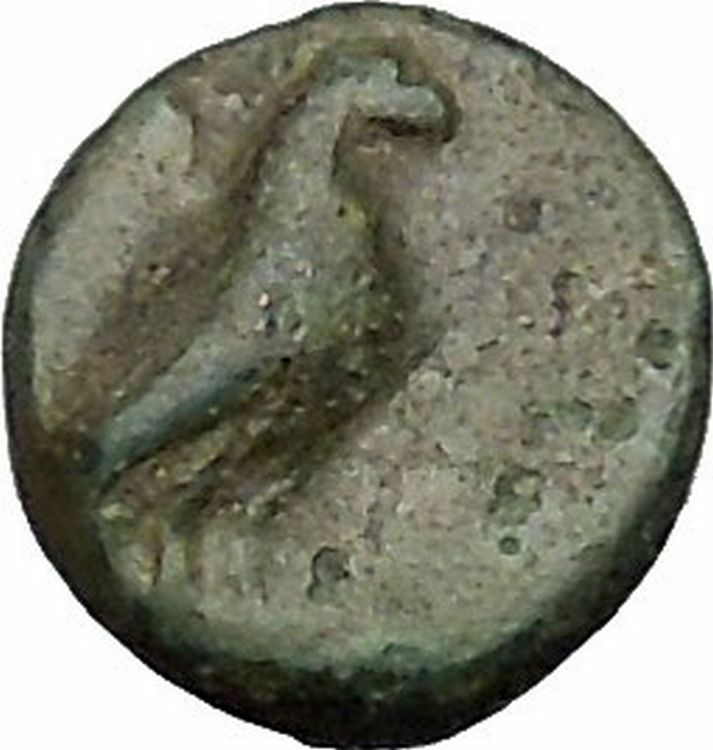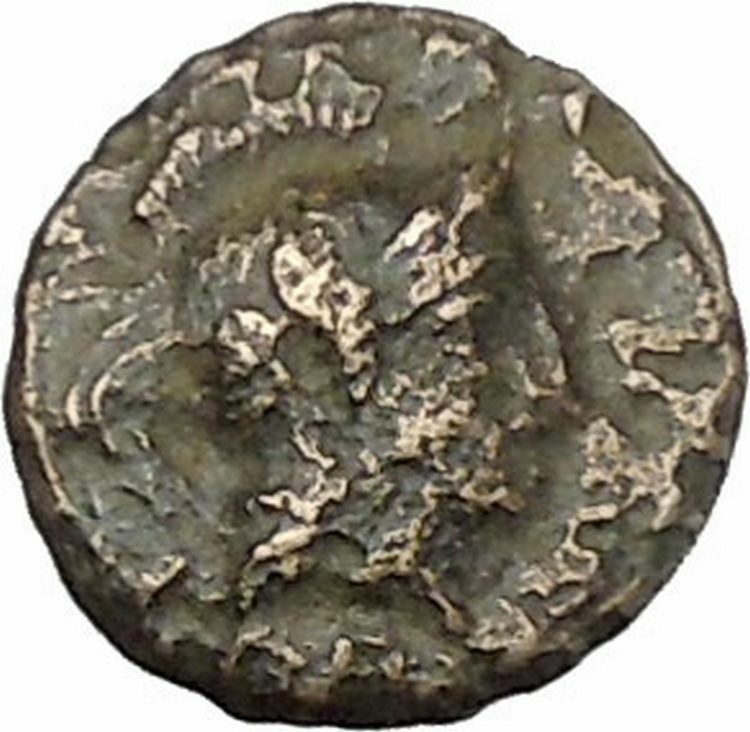|
Greek city of Messana in
Sicily
under the name of Mamertini “Sons of Mars”
Bronze 27mm (15.12 grams) Struck circa 275-264 B.C.
Reference: HGC 2, 864; Sarstrom 1940, Series IA, nos. 1-8
Laureate head of Ares right, helmet to left.
MAMEPTINΩN, Bull charging left.
A force of Oscan mercenaries, named Mamertini, attacked and captured Messana about 288 B.C. The
inhabitants were massacred and the new regime ruled the city until Roman times.
You are bidding on the exact item pictured,
provided with a Certificate of Authenticity and Lifetime Guarantee of
Authenticity.

Ares
is the
Greek god
of war
. He is one of the
Twelve Olympians
, and the son of
Zeus and Hera
. In
Greek literature
, he often represents the
physical or violent aspect of war, in contrast to the armored
Athena
, whose functions as a
goddess of intelligence
include
military strategy
and
generalship
.
The Greeks were
ambivalent
toward Ares: although he embodied
the physical valor necessary for success in war, he was a dangerous force,
“overwhelming, insatiable in battle, destructive, and man-slaughtering.” Fear
(Phobos)
and Terror (Deimos)
were yoked to his battle
chariot
. In the
Iliad
his father Zeus tells him that he is
the god most hateful to him. An association with Ares endows places and objects
with a savage, dangerous, or militarized quality. His value as a war god is even
placed in doubt: during the
Trojan War
, Ares was on the losing side, while
Athena, often depicted in
Greek art
as holding
Nike (Victory)
in her hand, favored the
triumphant Greeks.
Ares plays a relatively limited role in
Greek mythology
as represented in literary
narratives, though his numerous love affairs and abundant offspring are often
alluded
to. When Ares does appear in myths, he
typically faces humiliation. He is well known as the lover of
Aphrodite
, the goddess of love who was married
to Hephaestus
, god of craftsmanship, but the most
famous story involving the couple shows them exposed to ridicule through the
wronged husband’s clever device.
The counterpart of Ares among the
Roman gods
is
Mars
, who as a father of the Roman people held
a more important and dignified place in
ancient Roman religion
for his agricultural and
tutelary
functions. During the
Hellenization
of
Latin literature
, the myths of Ares were
reinterpreted
by Roman writers under the name
of Mars. Greek writers under
Roman rule
also recorded
cult practices
and beliefs pertaining to Mars
under the name of Ares. Thus in the
classical tradition
of later
Western art and literature
, the mythology of
the two figures becomes virtually indistinguishable.
Messana in Sicily
founded by
Greek
colonists in the
8th century BCE
, Messina was originally called
Zancle, from the
Greek
: ζάγκλον
meaning “scythe”
because of the shape of its natural harbour (though a legend attributes the name
to King Zanclus
). A
comune
of its province, located at the
southern entrance of the
Strait of Messina
, is to this day called ‘Scaletta
Zanclea’. In the early
5th century BC
,
Anaxilas of Rhegium
renamed it Messene
in honour of the Greek city
Messene
(Greek:
Μεσσήνη). (See also
List of traditional Greek place names
.) The
city was
sacked in 397 BC
by the
Carthaginians
and then reconquered by
Dionysius I of Syracuse
.
In 288 BC the
Mamertines
seized the city by treachery,
killing all the men and taking the women as their wives. The city became a base
from which they ravaged the countryside, leading to a conflict with the
expanding regional empire of
Syracuse
.
Hiero II
, tyrant of Syracuse, defeated the
Mamertines near
Mylae
on the
Longanus River
and besieged Messina.
Carthage
assisted the Mamertines because of a
long-standing conflict with Syracuse over dominance in Sicily. When Hiero
attacked a second time in 264 BC, the Mamertines petitioned
Rome for an alliance, hoping for more reliable protection. Although
initially reluctant to assist lest it encourage other mercenary groups to
mutiny, Rome was unwilling to see Carthaginian power spread further over Sicily
and encroach on Italy. Rome therefore entered into an alliance with the
Mamertines. In 264 BC, Roman troops were deployed to Sicily, the first time a
Roman army acted outside the
Italian Peninsula
.
At the end of the
First Punic War
it was a free city allied with
Rome. In Roman times Messina, then known as Messana, had an important
pharos
(lighthouse). Messana was the base of
Sextus Pompeius
, during his war against
Octavian
.
After the fall of the
Roman Empire
, the city was successively
conquered by the Goths
, then by the
Byzantine Empire
in 535, by the
Arabs
in 842, and in 1061 by the
Norman
brothers
Robert Guiscard
and
Roger Guiscard
(later count Roger I of Sicily).
In 1189 the English King
Richard I, (“The Lionheart”)
stopped at
Messina en route to the
Holy Land
and briefly occupied the city after a
dispute over the dowry of his sister, who had been married to
William the Good, King of Sicily
Messina was most likely the harbour at which the
Black Death
entered
Europe
: the plague was brought by
Genoese
ships coming from
Caffa
in the
Crimea
. In 1548
St. Ignatius
founded there the first
Jesuit
college
of the world, which later gave birth to
the Studium Generale (the current
University of Messina
).
The Mamertines (Mamertini “sons of Mars”) were
mercenaries
of Italian
origin
who had been hired from their home in
Campania
by
Agathocles
,
the king of
Syracuse
. After
Syracuse
lost the
Third Sicilian War
, the city of
Messene
was
ceded to Carthage
in 307
BC
. When Agathocles died in
289 BC
he left
many of his mercenaries idle and unemployed in
Sicily
. Most of
them returned home but some liking the climate and the prospect of adventure on
a foreign island remained. They played a major role in the lead up to the
First Punic War
.
In 280 BC, the Mamertines appealed to King
Pyrrhus of Epirus
for help. During this time, Rome began expanding into
Magna
Graecia
, and they also appealed for help. This action sparked the
Pyrrhic
War
. Pyrrhus was proclaimed king of Sicily and began his fight against the
Carthaginians, in which he scored several great victories. Pyrrhus, though a
great commander, mistreated the Sicilians, who quit supporting Pyrrhus. After a
few great victories, Pyrrhus abandoned his campaign and left for the states of
Southern Italy
,
who also appealed to him for help. Pyrrhus fought, but eventually returned to
Epirus after the
Battle of Beneventum (275 BC)
.
//
Capture
of Messana
The then small band of desperados came across the walled
Greek
settlement of Messana (now
Messina
).
Messana was a strategic point, built on the north-eastern tip of Sicily and it
with the fort
Rhegium
on the toe of Italy, were the crossing points of the straits between
Italy and Sicily. Being a peaceful people, the inhabitants allowed the
travelling mercenaries into their homes. After a time, the mercenaries became
restless and plotted to capture the town. One night, the mercenaries betrayed
their hosts and killed most of the population who were unprepared. In this way,
they claimed Messana for themselves. The surviving Messanians were thrown out
and the property and women divided. After their victory, the mercenaries named
themselves the Mamertines after the
Oscan war-god
Mamers
.
Dominion
over north-eastern Sicily
The Mamertines held the town of Messana for over 20 years. They changed it
from being a bustling town of farmers and traders to a raiding base. The
Mamertines became pirates on land and sea. Taking advantage of the peacefulness
of the Sicilians they looted the nearby settlements and captured unwary trade
ships on the strait, carrying their plunder back to their base. They captured
prisoners and demanded tribute. During this period, they struck coins on which
their name is printed and images of their gods and goddesses. Their exploits
made them rich and powerful. They began travelling further inland, even as far
as Gela
.
Decline
The Mamertine presence did not go unchallenged forever. In around
270 BC
, the
Mamertine exploits came to the attention of
Syracuse
, by word of the refugees from the settlements.
Hiero II of Syracuse
began to gather an army of citizens with which to rid
the land of the destroyers of the peace and rescue his Greek kinsmen.
Hiero met with the Mamertines when they were nearing Syracuse. Marching out
his troops, he first sent his unruly mercenaries forward and allowed them to be
butchered by the Mamertines. The faithless part of his army disposed of, Hiero
marched his citizen soldiers back to the city where he drilled them to a better
fighting condition. Leading his confident army north, he found the Mamertines
again at the
Longanus River
on the plain of
Mylae
where he easily defeated them, since the Mamertines were not
accustomed to large pitched battles and had become reckless after beating
Hiero’s mercenaries. In the battle, Hiero captured the Mamertine leaders and the
remnants fled back to the safety of Messana. Hiero had restricted the Mamertine
activity and placed them in a dire situation.
When Hiero returned to besiege their base (Messana) in
265 BC
the
Mamertines called for help from a nearby fleet from
Carthage
,
which occupied the harbor of Messana. Seeing this, the Syracuse forces retired,
not wishing to confront Carthaginian forces. Uncomfortable under the Cathaginian
“protection,” the Mamertines now appealed to
Rome
to be allowed into the protection of the Roman people. At first,
the Romans did not wish to come to the aid of soldiers who had unjustly stolen a
city from its rightful possessors. However, unwilling to see Carthaginian power
spread further over Sicily and get too close to Italy, Rome responded by
entering into an alliance with the Mamertines. In response, Syracuse allied
itself with Carthage
, imploring their protection. With Rome and Carthage brought
into conflict, the Syracuse/Mamertine conflict escalated into the
First Punic War
.
Ironically, once the scale of the conflict had escalated beyond them, the
Mamertines were lost to the historical record and their fate is lost, swallowed
up in the larger events of the
Punic wars
.
Legacy
After the First Punic War, the Mamertines are lost to history, although their
name was not quite forgotten in the ancient world since “Mamertine wine” from
the vineyards of north-eastern tip of Sicily was still known and enjoyed in the
first century. It was the favourite of
Julius Caesar
and it was he who made it popular after serving it at a feast
to celebrate his third consulship.
Even centuries after the Mamertine occupation, the inhabitants of Messana
were still called Mamertines.
In his novel
Salammbô
,
Gustave Flaubert
writes of the Greeks singing the ‘old song of the
Mamertines’: “With my lance and sword I plough and reap; I am master of the
house! The disarmed man falls at my feet and calls me Lord and Great King.”
|









